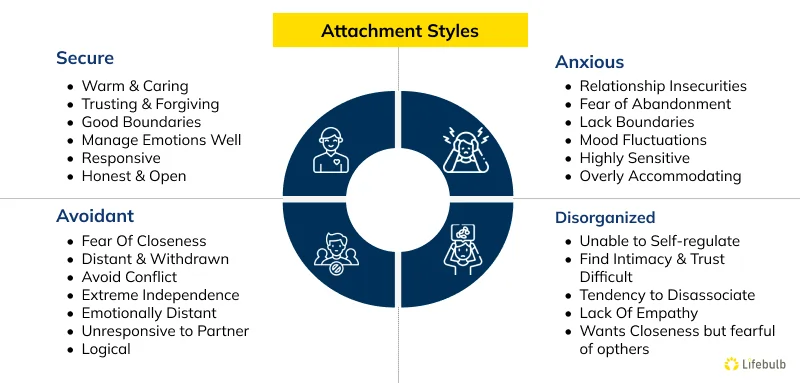When the floggers are finally still and the adrenaline fades, aftercare steps in to stitch bodies and emotions back together. Yet a single blanket or cuddle script rarely fits all. The way we bond—our attachment style—shapes what feels soothing or suffocating once a scene ends. In this guide I explore how aftercare meets attachment styles so every partner leaves grounded, seen, and eager to play again.
Why Attachment Style Belongs in Your Aftercare Kit
Attachment theory describes four common patterns: secure, anxious, avoidant, and disorganized (sometimes called fearful-avoidant). Each pattern influences how we seek closeness, handle vulnerability, and interpret silence. When aftercare meets attachment styles we shift from “standard water and cuddles” to bespoke rituals that speak directly to each nervous system.
Snapshot of Each Style in a Kink Context
- Secure: Trusts easily, expects support, adapts when plans change.
- Anxious: Craves reassurance, worries about abandonment, may spiral if messages go unanswered.
- Avoidant: Values autonomy, needs space to process emotion, can feel smothered by prolonged cuddling.
- Disorganized: Oscillates between anxious pull and avoidant push, often shaped by past trauma, needs clear structure plus gentle flexibility.
Core Pillars When Aftercare Meets Attachment Styles
- Negotiation up front – Ask, “What feels most settling right after a scene?” before the first toy comes out.
- Predictability – Communicate timelines: “We will debrief for fifteen minutes, then I will check on you tomorrow at noon.”
- Sensory attunement – Some bodies crave weighted pressure; others calm faster when sitting side-by-side without touch.
- Reassurance and agency – Offer choices rather than assumptions: “Would you like a blanket or would water feel better first?”
Tailored Aftercare for Each Attachment Pattern
Anxious Attachment: Reassurance on Repeat
People with anxious patterns often ride a roller coaster of “Was I good enough?” the moment impact stops. Here is how aftercare meets attachment styles for them:
- Immediate physical or verbal contact – Think eye contact and calm words within seconds of ending the scene.
- Time-stamped check-ins – Promise and deliver: “I’ll text you at 10 a.m. to see how you slept.”
- Positive affirmations – “You did beautifully; I loved how you breathed through that last set.”
- Comfort objects – Weighted blankets or a hoodie that smells like the top offer tactile reminders of connection when alone later.
Avoidant Attachment: Respect the Recharge Zone
Avoidant partners may love the scene yet bristle at post-scene cling. Here’s how aftercare meets attachment styles without forcing closeness:
- Offer, don’t insist – “Would you like a hug now, or prefer a glass of water and some space?”
- Solo decompression options – Provide a quiet corner, headphones, or journal time.
- Written debriefs – Suggest a shared doc where feelings can be typed when ready; it removes on-the-spot pressure.
- Scheduled, concise follow-ups – A brief “Just checking you’re okay; message if you need” respects autonomy while keeping a safety net.
Secure Attachment: Blend and Adapt
Securely attached partners handle novelty well. Still, tailoring boosts satisfaction:
- Collaborative planning – Invite them to suggest new aftercare elements; their stability makes experimentation safer.
- Balance of closeness and independence – Mix shared cuddles with moments to breathe separately if desired.
- Reinforce mutual trust – A quick appreciation exchange (“One thing I loved about tonight was…”) deepens connection for everyone.
Disorganized/Fearful-Avoidant Attachment: Safety Through Structure
This pattern blends craving intimacy with fearing it. Trauma-informed practices are key when aftercare meets attachment styles here:
- Crystal-clear sequence – “First water, then blanket, then a five-minute silent hold, then talk.”
- Grounding tools – Name five things you see/hear/feel together to anchor in the present.
- Choice points – Offer opt-outs during the plan: “If talking feels heavy, we can switch to journaling.”
- Professional resources – Encourage therapy or support groups if flashbacks or dissociation arise.
Multi-Partner and Group Scenes
When multiple attachment styles share space, layering becomes essential. Designate a “quiet cuddle pile” zone and a “solo chill” corner. Rotate tops or dungeon monitors to check on each bottom according to their plan. Clear signals—colored wristbands or cue cards—help everyone know who wants touch versus talk. This is extremely important when aftercare meets attachment styles.
Spotting Attachment Triggers in Real Time
When adrenaline fades, subtle cues tell you whether aftercare meets attachment styles successfully or needs a course-correction. Watch for micro-signals: an anxious partner may grip harder or search your eyes if reassurance lags; an avoidant partner might shift away or turn their shoulders when touch lasts too long. Secure partners rarely show distress, but if they suddenly go quiet, fatigue might be kicking in. Disorganized partners can toggle between cling and retreat within minutes—steady your tone, name what you see (“I notice you’re pulling back; want to pause or try grounding?”), and offer choices. Reading these cues on the fly lets you tweak aftercare in the moment instead of waiting until the next scene.
Building an Adaptable Aftercare Toolkit
- Preference tracker – Keep a shared note detailing each partner’s preferred snacks, words, and touch levels.
- Modular items – Stock water bottles, protein bars, blankets, fidget toys, and calming playlists so choices abound.
- Debrief ritual – End every session with three prompts: What felt good? What felt edgy? What would we tweak next time? Over time the answers reveal how aftercare meets attachment styles most effectively.
Key Takeaways
- Attachment patterns shape post-scene needs as much as pain tolerance shapes play.
- Negotiation and predictability are non-negotiable when aftercare meets attachment styles.
- Anxious partners thrive on swift reassurance; avoidant partners settle with space; secure partners flex; disorganized partners count on structure.
- Mixed-style group scenes succeed with color-coded signals and multiple zones.
- A living toolkit and regular debriefs keep aftercare evolving alongside relationships.
Next Steps
- Want more negotiation tools? Check out Negotiating D/s Over Text for clear scripts and safety tips.
- Looking to boost presence during play? Read Finding Your Dominant Voice for confidence-building vocal drills.
- Curious about sensory-aware scenes? My guide on Sensory Friendly Impact Play pairs perfectly with the attachment-focused aftercare ideas above.
- Need personalized support? Book a coaching session and we’ll craft an aftercare plan tailored to your relationships and nervous systems.











